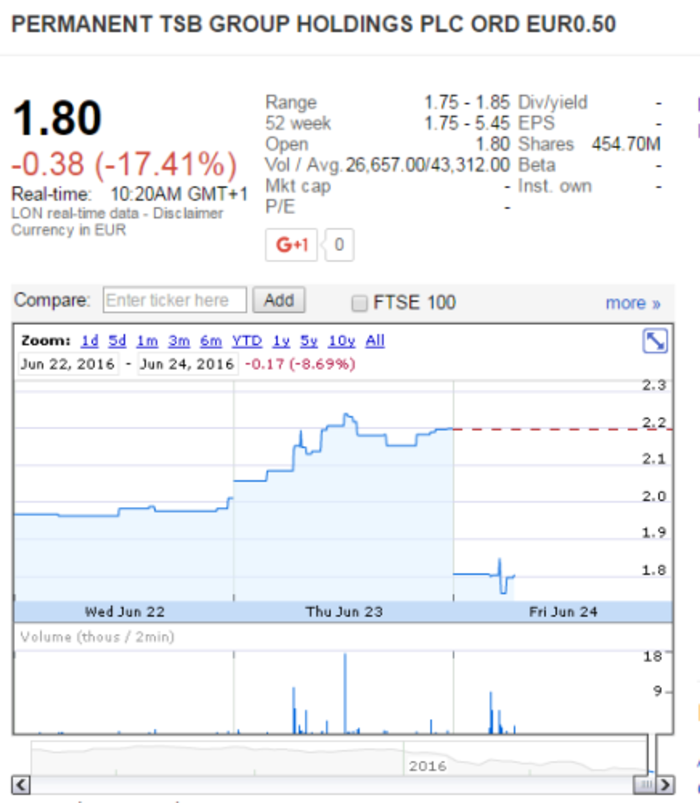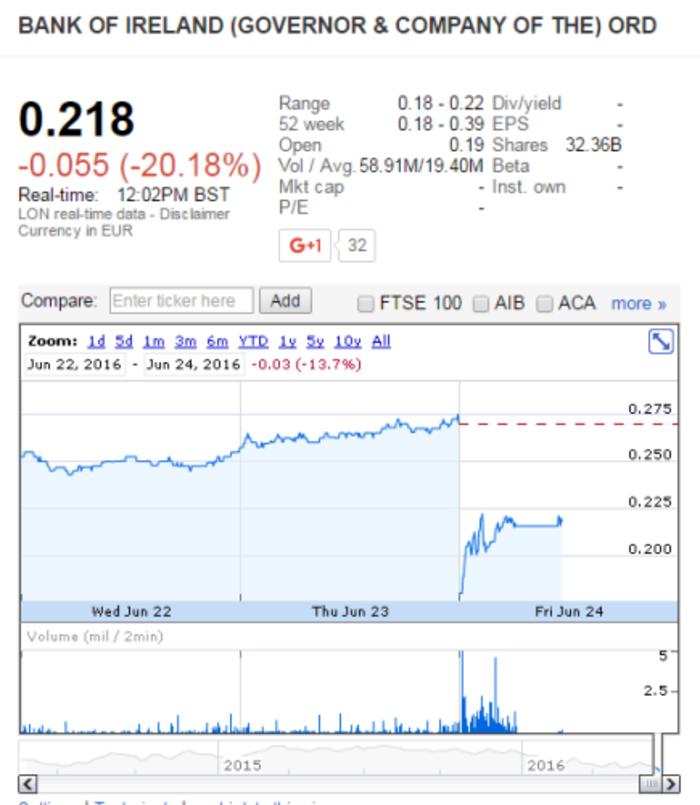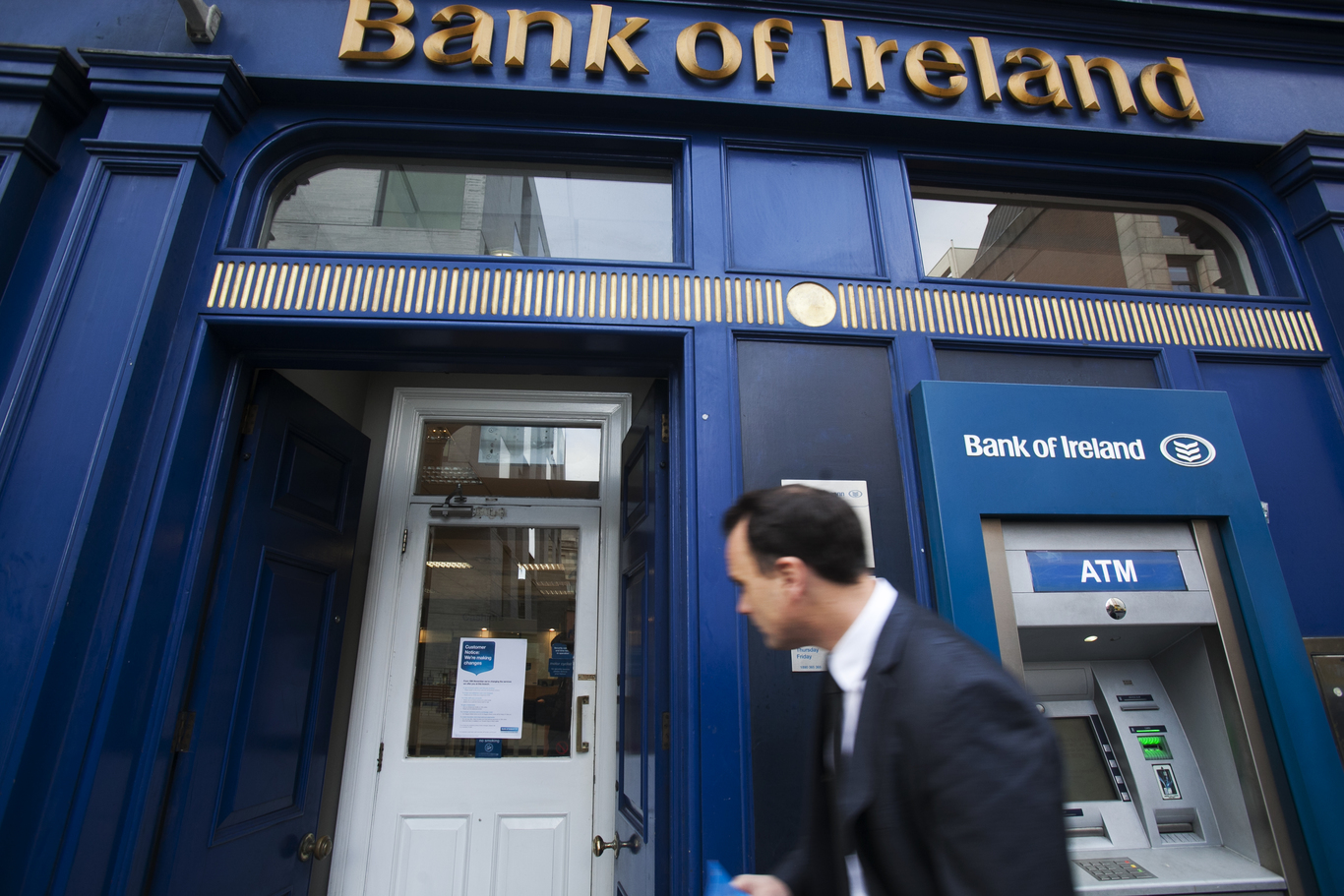Over €360m wiped off value of Irish taxpayers' stake in banks after Brexit vote
Shares in Bank of Ireland and Permanent TSB took a dive this morning with the surprise result.
THE VALUE OF the taxpayers’ stake in two of Ireland’s biggest banks has dropped by more than €360 million following the UK’s shock decision to leave the European Union.
Irish companies across the board saw their stock prices plunge this morning after the vote, with the value of shares on the Irish Stock Exchange currently down by about 10%.
Businesses that are perceived to be strongly exposed to the UK took the brunt of the hit, with banks struck particularly hard.
At the time of writing Bank of Ireland’s share price is down by about a fifth since markets opened this morning.
Permanent TSB (PTSB) saw its value plunge by almost a quarter in early morning trading. Although it has recovered somewhat, its share price is still down by around 17%.
What does it mean for us?
The Irish state has significant stakes in both banks as a result of the bailout, owning about 14% of Bank of Ireland and three-quarters of PTSB.
The state also owns 99.8% of AIB. This accounts for most of the theoretical value of the Irish taxpayer’s stake in the banks, around €20 billion.
The rest of the bank’s shares, 0.2%, are traded on the junior stock exchange in Dublin, but the amount listed is so small any changes are negligible and so changes to its value are not included here.
A quick note that all prices are correct as of the time of writing. Stock prices often rise after big drops, so these prices could recover in the coming hours or days depending on how markets react.
The drop in PTSB’s share price, while sharp, is also slightly less significant as only a quarter of its shares are listed on the stock market, with the rest held by the government.
Due to this a smaller number of people trading can have a big impact on its share price compared to a company with 100% of its shares on the market.
Nonetheless the value of the Irish taxpayer’s stake in the lender is worth almost €131 million less today than it was yesterday. Overall the bank currently has a market capitalisation of about €820 million compared to just under €1 billion as of the close of business on Thursday.

Bank of Ireland, which is listed on the main market in London as well as Dublin, has a lot more shares listed and also saw a similar drop. The value of the state’s stake in the bank is down by about €236 million as of the time of writing.
Bank of Ireland’s total market capitalisation is down from €8.74 billion at the close of business yesterday to just over €7 billion.

Impact
Speaking to Fora. David Holohan, the head of research at Merrion Stockbrokers, predicted that it is unlikely that bank shares will recover in the near term.
“If you look at the banking industry in Europe it has been one of the worst performing sectors because with the low interest rates it’s hard for them to make money, and the Brexit uncertainty means that it is unlikely that they will rebound soon,” he said.
“Bank of Ireland was hit hard because it has a significant venture in the UK with the post office and while it isn’t material to the group, it is still an uncertainty.
“PTSB has fallen far as well and if there are concerns over the Irish economy over the impact of a Brexit it will be difficult for either of them to outperform.”
He said that it limits what the government can do until it becomes known what the possible impact of the UK vote will be.
“For the next six to 12 months they can’t do much with the stakes in either of the banks,” he said.
“They (the government) will likely have to wait longer than they would have (to sell bank shares) after the decision, it is a game changer and I think it will take time for the market to settle.”
In a note published this morning, Goodbody Stockbrokers also predicted that the banks will likely be hurt by the vote for several reasons, including the drop in sterling and a likely slowdown in mortgage lending.






